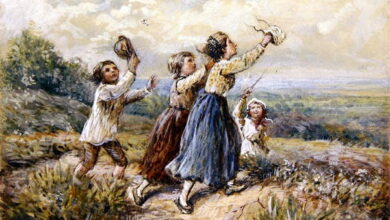Frost’s Theme of Isolation
One of the most striking themes of Frost is man’s isolation in the universe or man’s sense of alienation from his environment. There is in Frost’s poetry a curious anti-social quality, far from Whitman’s dear love of comrades. He has a strong disinclination towards city life which has gone beyond a dislike of the city life. For instance, he has written no poems of friendship. He has written love-poems but misunderstandings are a constant theme in them, produced by some deep solitariness, some unbreakable barrier between soul and soul.
A circumstance in Frost’s personal life too contributed to the theme of isolation. Frost’s sister, Jeanie, had become totally alienated from the world, unable to accept the coarseness and brutality of existence. Frost’s sadness in being unable to dissuade her from the view of things is similar to the plight of the husband in “Home Burial”. The young woman in this poem cannot reconcile herself to the death of her child and becomes totally alienated.
Frost in his poems isolates the individual. Poem after poem shows the speaker running off or living the life alone. He who flees goes to confront the vast enigma of space and the night.
The memorable female figures in his poems all show some kind of singularity. If loneliness may be stimulating for the male, for the female it is likely to be disastrous.
One luminary clock against the sky
Proclaimed the time was neither wrong nor right.
I have been one acquainted with the night.
This poem deserves comparison with “Desert Places” which too has loneliness or isolation as its theme. All animals have taken shelter in their lairs. The poet is oppressed by a feeling of loneliness:
And lonely as it is that loneliness
Will be more lonely ere it will be less.
 The poet is not afraid of the empty spaces between the stars, stars on which there is no human race. Why should they scare him with their empty spaces, when the poet has his own “desert places” to scare him? The pathos of this poem is very touching:
The poet is not afraid of the empty spaces between the stars, stars on which there is no human race. Why should they scare him with their empty spaces, when the poet has his own “desert places” to scare him? The pathos of this poem is very touching:I have it in me so much nearer home
To scare myself with my own desert places.
A poem called “The Fear” has the following concluding lines:
You understand that we have to be careful.
This is a very, very lonely place.
“Bereft”, too deals with this theme. “It portrays a bleak realization of absolute loneliness, a sudden, despairing sense of loss”. In this poem there is absolutely no relief from the loneliness. The poem moves in part of the same lines as “Desert Places”, from a scene of threatening images and desolation to still greater loneliness. Loneliness could not have been expressed more simply, more emphatically and more pathetically than in the concluding lines:
World I was in the house alone
Somehow must have gotten abroad,
Word I was in my life alone,
Word I had no one left but God.
The feeling of isolation in this poem lends poignancy to the scene, while the identification of hostility of Nature aggravates the feeling of isolation. The last line is not a cry of faith but an agonized scene of absolute mourning. The emotional emphasis is on “no one”.
Through Frost discusses the theme of alienation yet he does not approve it. It is true that he does not condemn it either. He portrays the barriers between man and man and to make dramatic projection of the theme of isolation. He dislikes isolation, but he sees its inevitability.
To the ordinary reader, such poems seem to imply a pessimistic view of human life. Frost regards the sense of isolation, not as a peculiarly American dilemma but as a universal situation. The poems having this theme are therefore truly realistic. Sometimes Frost approaches the problem of isolation in an optimistic manner as in “Our Hold on the Planet”.

